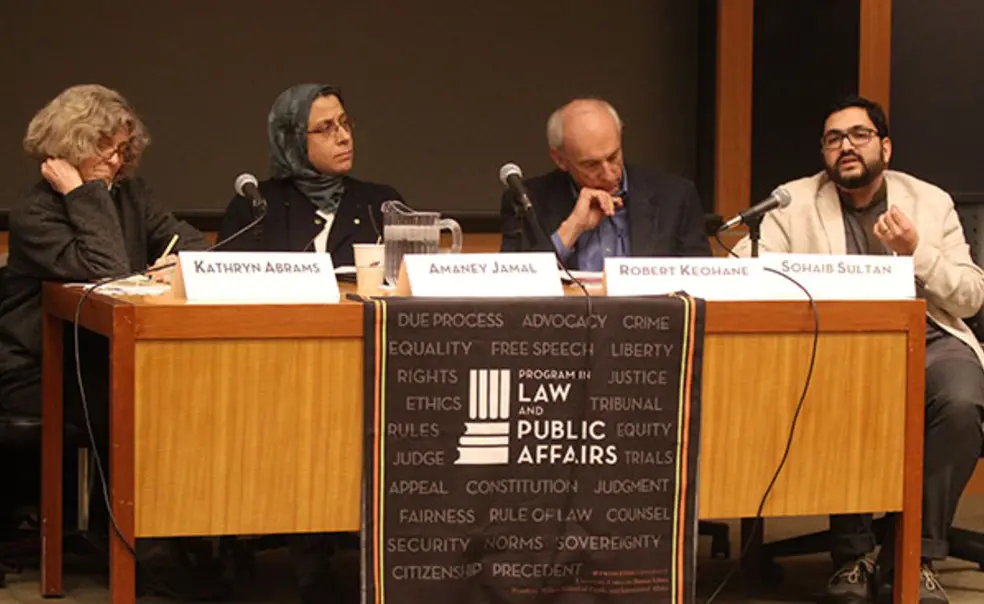Discussion of Immigrant, Refugee Rights Sees Trump’s Aims as Misguided
Immigration order is “an American issue,” not just a Muslim one, says Professor Jamal
The notion that President Donald Trump’s executive order on immigration is solely a Muslim problem is fundamentally misguided, politics professor Amaney Jamal told more than 100 students and community members at a Feb. 21 panel. “This is not just a Muslim issue, it’s an American issue,” she said.
Jamal was one of four panelists gathered by the Program in Law and Public Affairs for a session titled “Trump and the Constitution: The Rights of Immigrants and Refugees.”
The Jan. 27 executive order, which was blocked following court challenges, poses a threat to international relations and harms the free exchange of ideas across borders, said Robert Keohane, professor of international affairs. Of greatest concern, he said, was the Trump administration’s claim that the order was unreviewable by the courts — a claim rejected by an appeals court panel. “If courts can’t review the presidency, then what you have is an elective executive dictatorship,” Keohane said.
The panelists also discussed the particular concerns of the Muslim community in response to the travel ban. “The very premise under which these executive orders have been signed — to prevent Muslim extremism from entering into the United States — is, in my opinion, a very faulty premise to begin with,” said Muslim Life Coordinator and Chaplain Sohaib Sultan. “The Islamaphobic tendencies not only of the president but also his advisers are greatly troubling and something we should be deeply aware of.”
Although perpetuating stereotype is certainly not a good thing, Jamal said, the executive order could actually benefit the Muslim community by forcing the mainstream media to focus on the roots of Islamophobia.
“What Trump has done for the Muslim community might actually be the best thing that’s happened to the Muslim community since 9/11,” Jamal said. “Because he’s been so egregious and so out there with his bias and his discrimination, it’s forced people to stand up and say, ‘Oh my God, this is so unfair.’ ”
Reports that the White House has been discussing designating the Muslim Brotherhood as a foreign terrorist organization, Jamal said, further demonstrate how the president’s positions conflict with American values. Such an order would be even more alarming than the immigration order, she said, because much of Islamic civil society has its roots in the Muslim Brotherhood.
“This would mean that Muslim students on almost every campus in the United States would be targeted by law enforcement, and that we would have to liquidate Muslim activity on these campuses as well,” Jamal said. “The political and civil liberties and rights of our students are at stake. We should all be concerned.”
Kathryn Abrams, a professor of law at UC Berkeley who is a visiting research scholar at Princeton, focused on the impact the administration’s actions have had on the detention and deportation of undocumented immigrants. She said that new guidelines violate the right to due process because immigration officers can now detain or deport certain immigrants without following standard legal procedures.












No responses yet